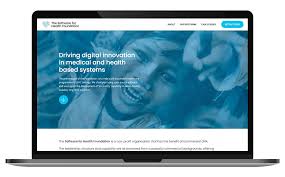Healthcare Website Development: Enhancing Patient Care and Accessibility
In today’s digital age, healthcare website development plays a crucial role in improving patient care and accessibility to medical services. With the increasing reliance on online platforms for information and services, healthcare providers are recognising the importance of having a strong online presence.
Developing a user-friendly and informative website can greatly benefit both patients and healthcare professionals. Patients can easily access important information such as services offered, medical resources, appointment scheduling, and contact details. This not only enhances convenience for patients but also improves communication between healthcare providers and their patients.
Furthermore, healthcare websites can serve as valuable educational tools, offering resources on various health conditions, treatments, preventive care, and wellness tips. This helps empower patients to take control of their health and make informed decisions about their care.
For healthcare professionals, a well-designed website can streamline administrative tasks such as appointment booking, prescription requests, and patient inquiries. This allows healthcare providers to focus more on delivering quality care to their patients.
Security and privacy are paramount when developing healthcare websites to ensure the protection of sensitive patient information. Implementing robust security measures and compliance with data protection regulations are essential components of healthcare website development.
In conclusion, healthcare website development is an essential aspect of modern healthcare delivery. By creating user-friendly websites that prioritise patient care and accessibility, healthcare providers can enhance the overall patient experience and improve the efficiency of their services.
Top 5 Tips for Developing an Effective Healthcare Website
- Ensure the website is user-friendly and easy to navigate for patients seeking information.
- Include clear and concise content about services offered, healthcare professionals, and contact information.
- Implement strong security measures to protect patient data and comply with data protection regulations.
- Optimize the website for mobile devices to cater to users accessing it on smartphones or tablets.
- Regularly update the website with relevant health articles, news, and updates to keep visitors engaged.
Ensure the website is user-friendly and easy to navigate for patients seeking information.
To enhance the user experience and accessibility of healthcare websites, it is crucial to ensure that the website is user-friendly and easy to navigate for patients seeking information. By designing a website with intuitive navigation, clear layout, and easily accessible information, healthcare providers can empower patients to find the information they need quickly and efficiently. A user-friendly website not only improves patient satisfaction but also encourages engagement and interaction, ultimately leading to better communication between patients and healthcare providers.
Include clear and concise content about services offered, healthcare professionals, and contact information.
When developing a healthcare website, it is crucial to include clear and concise content about the services offered, healthcare professionals, and contact information. Providing detailed information about the range of services available helps patients understand the care options provided by the healthcare facility. Introducing healthcare professionals through brief profiles can establish trust and credibility with visitors seeking medical expertise. Additionally, prominently displaying contact information such as phone numbers, email addresses, and location details ensures easy access for patients looking to make appointments or inquire about services. Clear and concise content in these areas enhances user experience and encourages engagement with the healthcare website.
Implement strong security measures to protect patient data and comply with data protection regulations.
Implementing strong security measures is paramount in healthcare website development to safeguard patient data and adhere to data protection regulations. By prioritising data security, healthcare providers can ensure the confidentiality and integrity of sensitive patient information stored on their websites. Compliance with data protection regulations not only helps build trust with patients but also mitigates the risk of data breaches and potential legal consequences. Prioritising robust security measures demonstrates a commitment to protecting patient privacy and upholding ethical standards in healthcare practices.
Optimize the website for mobile devices to cater to users accessing it on smartphones or tablets.
To enhance the accessibility and user experience of a healthcare website, it is crucial to optimise the site for mobile devices. With an increasing number of users accessing websites on smartphones and tablets, ensuring that the website is responsive and mobile-friendly is essential. By optimising the website for mobile devices, healthcare providers can cater to a wider audience and provide seamless access to important information and services on-the-go. This approach not only improves user satisfaction but also demonstrates a commitment to meeting the evolving needs of patients in today’s digital landscape.
Regularly update the website with relevant health articles, news, and updates to keep visitors engaged.
Regularly updating a healthcare website with relevant health articles, news, and updates is essential to keep visitors engaged and informed. By providing fresh and valuable content, healthcare websites can establish themselves as reliable sources of information and attract returning visitors. Keeping the website up-to-date with the latest developments in the healthcare industry not only enhances user engagement but also demonstrates a commitment to providing current and accurate information to visitors. This practice not only helps in retaining existing visitors but also attracts new ones who are seeking trustworthy healthcare resources.

